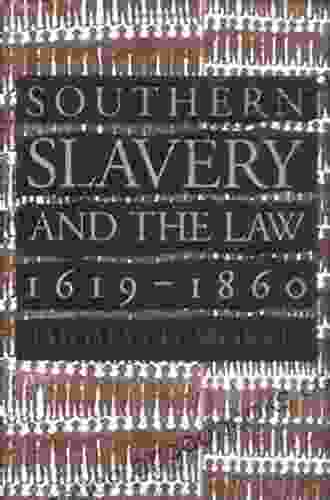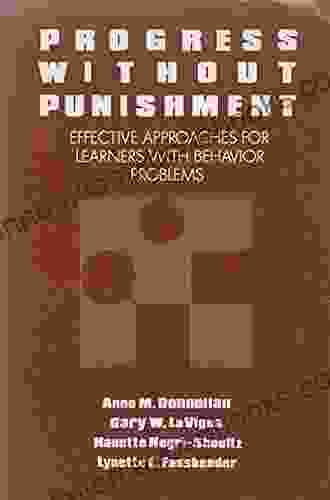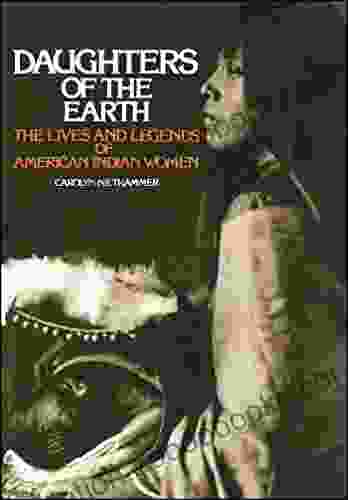Unveiling the Legal Framework of Southern Slavery: A Comprehensive Exploration of Southern Slavery And The Law 1619-1860

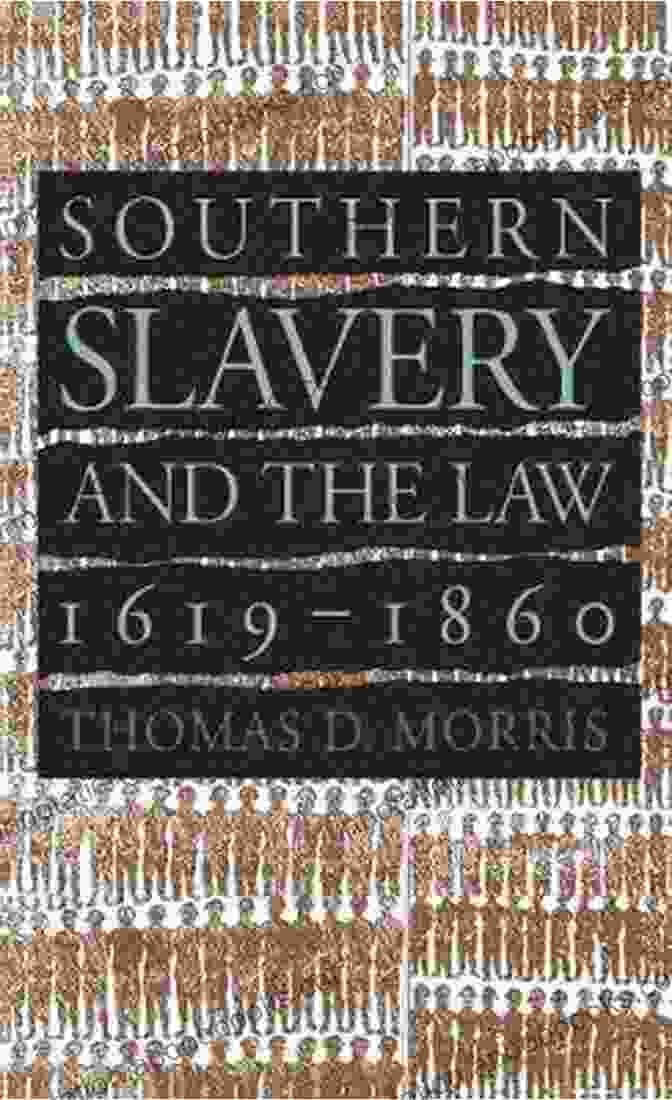
In the annals of American history, the institution of slavery casts a long and dark shadow. The legal framework that underpinned this abhorrent practice played a pivotal role in shaping the lives of millions of enslaved individuals. "Southern Slavery And The Law 1619-1860: Studies In Legal History" delves deep into the complex and evolving legal landscape that governed Southern slavery, providing a comprehensive understanding of its insidious impact on American society.
4.4 out of 5
| Language | : | English |
| File size | : | 4652 KB |
| Text-to-Speech | : | Enabled |
| Screen Reader | : | Supported |
| Enhanced typesetting | : | Enabled |
| Word Wise | : | Enabled |
| Print length | : | 579 pages |
The Genesis of Slave Law
The legal foundation of Southern slavery took root in the early 17th century with the arrival of enslaved Africans in the British colonies. Initially, the status of these individuals was governed by common law principles, but as the slave population grew, a distinct body of slave law emerged. This law was largely influenced by the legal systems of other slave societies, such as the Caribbean and Latin America.
Defining the Slave as Property
At the core of slave law was the concept that slaves were chattel, or personal property. This legal fiction dehumanized enslaved individuals and stripped them of all fundamental rights. They could be bought, sold, traded, and inherited like any other commodity. The law also denied slaves the right to own property, enter into contracts, or testify in court.
Controlling and Punishing Slaves
Slave law granted slaveholders extensive powers to control and punish their human chattel. Slave codes, enacted by state legislatures, prescribed various forms of punishment for offenses ranging from disobedience to running away. These punishments included whipping, branding, imprisonment, and even death. Slaveholders also had the right to discipline their slaves with impunity, often resorting to excessive and cruel violence.
The Slave Family and Community
Despite the legal constraints imposed upon them, enslaved individuals forged strong family and community ties. However, slave law sought to undermine these bonds. Marriages between slaves were not recognized by the law, and children born to enslaved mothers automatically inherited their status. Slaveholders frequently separated families by selling or trading members to other plantations, tearing apart the fabric of their lives.
Resistance and the Law
Enslaved individuals did not passively accept their subjugation. They resisted in various forms, from subtle acts of defiance to organized revolts. Slave law responded to this resistance with harsh penalties, including increased surveillance, stricter punishments, and the suppression of any perceived threats to the slave system.
The Abolitionist Movement and Legal Challenges
As the abolitionist movement gained momentum in the 19th century, legal challenges to slavery began to emerge. Abolitionists argued that slavery violated natural rights and was incompatible with the principles of American democracy. These challenges, combined with the growing economic and political tensions between the North and the South, ultimately led to the Civil War.
The Legacy of Slave Law
The legal framework of Southern slavery had a profound and lasting impact on American society. It shaped the racial hierarchy that persisted after the Civil War and contributed to the systems of racial discrimination and inequality that continue to plague the United States today.
Unveiling the Legal Intricacies
"Southern Slavery And The Law 1619-1860: Studies In Legal History" offers a comprehensive examination of the legal underpinnings of Southern slavery. Through meticulous research and analysis, the book explores the origins, evolution, and application of slave law in the American South. It delves into the legal theories and justifications used to rationalize slavery, as well as the legal battles fought to challenge and dismantle this oppressive system.
For Scholars and Historians
This groundbreaking work is an indispensable resource for scholars and historians seeking a deeper understanding of the legal framework of Southern slavery. It provides a comprehensive overview of the primary sources and secondary literature on the subject, making it an essential reference for anyone researching this pivotal period in American history.
For Students and Educators
"Southern Slavery And The Law 1619-1860: Studies In Legal History" is an invaluable resource for students and educators seeking to gain a comprehensive understanding of the legal aspects of slavery in the American South. Its clear and engaging writing style makes it accessible to students at all levels, while its thorough analysis provides educators with a wealth of material for classroom instruction.
A Call to Confront the Past
More than a mere historical account, "Southern Slavery And The Law 1619-1860: Studies In Legal History" is a poignant reminder of the horrors of slavery and the ongoing struggle for racial justice in America. By understanding the legal framework that allowed such an abhorrent institution to flourish, we can better confront the legacy of slavery and work towards a more just and equitable society.
4.4 out of 5
| Language | : | English |
| File size | : | 4652 KB |
| Text-to-Speech | : | Enabled |
| Screen Reader | : | Supported |
| Enhanced typesetting | : | Enabled |
| Word Wise | : | Enabled |
| Print length | : | 579 pages |
Do you want to contribute by writing guest posts on this blog?
Please contact us and send us a resume of previous articles that you have written.
 Book
Book Novel
Novel Page
Page Chapter
Chapter Text
Text Story
Story Genre
Genre Reader
Reader Library
Library Paperback
Paperback E-book
E-book Magazine
Magazine Newspaper
Newspaper Paragraph
Paragraph Sentence
Sentence Bookmark
Bookmark Shelf
Shelf Glossary
Glossary Bibliography
Bibliography Foreword
Foreword Preface
Preface Synopsis
Synopsis Annotation
Annotation Footnote
Footnote Manuscript
Manuscript Scroll
Scroll Codex
Codex Tome
Tome Bestseller
Bestseller Classics
Classics Library card
Library card Narrative
Narrative Biography
Biography Autobiography
Autobiography Memoir
Memoir Reference
Reference Encyclopedia
Encyclopedia Cheryl Deines
Cheryl Deines Harley Wylde
Harley Wylde Christopher H Owen
Christopher H Owen Thierry Brenner
Thierry Brenner Hazem Kandil
Hazem Kandil Christina Tetreault
Christina Tetreault Christopher Buehlman
Christopher Buehlman Christopher J Bosso
Christopher J Bosso Laure Eve
Laure Eve Renhui
Renhui Paul Wells
Paul Wells Clark Kimberling
Clark Kimberling Shasta Nelson
Shasta Nelson Jesse Stone
Jesse Stone Ed Adams
Ed Adams Jess Ryder
Jess Ryder Chelle Bliss
Chelle Bliss Troy Brown
Troy Brown Henry Abramson
Henry Abramson Cheryl Jerabek
Cheryl Jerabek
Light bulbAdvertise smarter! Our strategic ad space ensures maximum exposure. Reserve your spot today!

 Langston HughesThe Diary of Madame Decadeaux Part. 1: A Literary Masterpiece That Transports...
Langston HughesThe Diary of Madame Decadeaux Part. 1: A Literary Masterpiece That Transports... Dan HendersonFollow ·9.6k
Dan HendersonFollow ·9.6k James GrayFollow ·6.9k
James GrayFollow ·6.9k Drew BellFollow ·15.8k
Drew BellFollow ·15.8k Stephen FosterFollow ·18.5k
Stephen FosterFollow ·18.5k Herman MitchellFollow ·16.9k
Herman MitchellFollow ·16.9k Pablo NerudaFollow ·13.2k
Pablo NerudaFollow ·13.2k Oscar BellFollow ·6.3k
Oscar BellFollow ·6.3k Isaias BlairFollow ·17.5k
Isaias BlairFollow ·17.5k

 Kevin Turner
Kevin TurnerDive into the Enchanting World of "Crazy Like Fox": A...
Prepare yourself for a literary adventure...
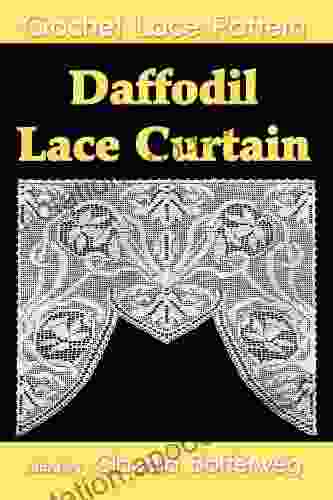
 Ralph Waldo Emerson
Ralph Waldo EmersonUnlock the Elegance of Daffodil Lace: An Immersive Guide...
: A Tapestry of Delicate...

 Gerald Parker
Gerald ParkerNever Lose An Argument Again: 20 Powerful Techniques From...
Are you tired of losing...

 Xavier Bell
Xavier BellSeven Animal Insertions Filet Crochet Pattern: Embark on...
Welcome to the captivating...

 Eugene Powell
Eugene PowellMagomago in TDS Magomago 12: An Unforgettable Adventure...
Step into the Enchanting World of...

 Marvin Hayes
Marvin HayesSoft Felting Needle Holder Excellence In Reborn Artistry
Unveiling the Secrets of the...
4.4 out of 5
| Language | : | English |
| File size | : | 4652 KB |
| Text-to-Speech | : | Enabled |
| Screen Reader | : | Supported |
| Enhanced typesetting | : | Enabled |
| Word Wise | : | Enabled |
| Print length | : | 579 pages |


